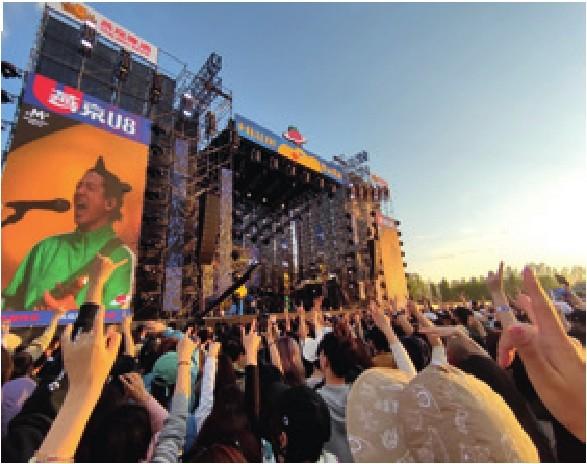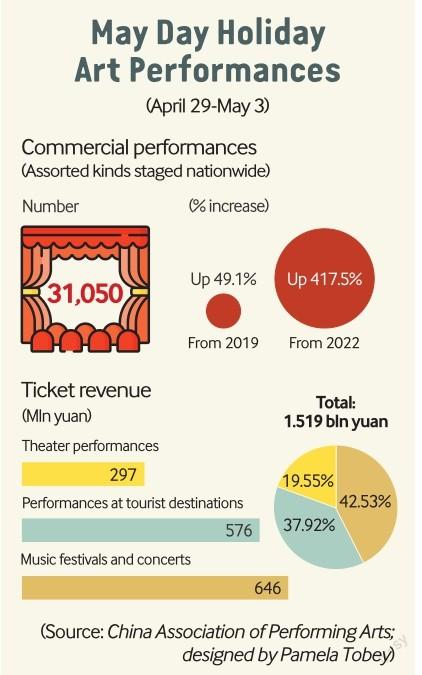Live and Kicking
By Lu Yan


While performing at the Rye Music Festival in Jinan, Shandong Province, on April 29, Lala Hsu, a singer from Chinas Taiwan Province, tearfully exclaimed, “Its been too long!”
She voiced the feelings of many live music fans who have long and eagerly been waiting for a musical fête to once again lose themselves in dazzling stage shows—and some pounding beats.
After a three-year hiatus due to the COVID-19 pandemic, several popular music festivals have recently gotten back on stage in China, gathering hundreds of thousands of stylish crowds hungry for a stellar musical extravaganza. As festival season got underway, audiences have already had a wonderful musical time at major happenings like the Strawberry Music Festival, one of the nations largest outdoor music events that has so far toured some 10 cities this year, and the Rye Music Festival, starring several iconic Chinese artists.
Rock on
Watching the 45-minute perspiration-soaked performance of Dada, one of the most recognizable and bestselling Chinese pop-rock bands and formed in 1996, at the Strawberry Music Festival in Beijings Yanqing District on April 30, Wang Dongxu told his toddler son joyfully sitting on his shoulders: “This was the band daddy liked when he was very young.”
“I brought my son here hoping to give him an unforgettable memory and plant the seeds of rock in his little heart,” the fortysomething father told Beijing Review. “Rock was my cushion against adversity when I was young. I hope that as he grows up, my son, too, can find comfort in it whenever he needs it.”
Another rock music aficionado at the event, Li Xiaowu, who attends university in Beijing, said it gives him a sense of freedom and relief. “Singing and just rocking back and forth at these festivals or live houses make me forget everything, even myself. I very much enjoy that feeling,” he told Beijing Review.
“But I would like to see tickets get cheaper,” Li added. During this annual May Day holiday, from April 29 to May 3 this year, “Could somebody please rein in exorbitant festival ticket prices?” was among the top trending hashtags on Weibo, Chinas Twitter equivalent. One netizen took the Strawberry Music Festival, first launched in Beijing in 2009, as an example and complained, “In the early days, a ticket only cost 80 yuan($11.5); now, its sixfold that.”
No business like show business
Music festivals, as we currently know them, date back to the 1950s when the Newport Jazz Festival was launched in Rhode Island, the U.S. But it took quite some years for the concept to reach China—in the year 2000, to be specific. That year, the first edition of the Midi Music Festival took place at the Midi School of Music, Chinas first contemporary music school founded in 1993, starring some 20 of its students. Known today as “Chinas Woodstock,” a reference to the legendary American music festival in 1969, the Midi Music Festival has propelled many rock bands to fame.
Free of charge and on a relatively small scale, this first Midi event was more like a high school prom. It wasnt until three years later that a proper outdoor music festival became available to fans. The festivals third edition lined up 50 bands from all over the country, with a daily audience number three to four times that of the first edition. But it still suffered financial losses.
More music festivals emerged in China. In August 2002, the Lijiang Snow Mountain Music Festival held at Ganhaizi, a meadow sitting at 3,100 meters above sea level in Lijiang, a famed tourist city in Yunnan Province, proved itself a milestone in the live music sector.

Although smaller in scale than its more recent counterparts, this occasion still holds a special place in rock ‘n roll hearts. It lined up icons like Cui Jian, known as the godfather of Chinese rock and also the festivals chief artistic officer, as well as legendary bands Second Hand Rose (Ershou Meigui) and Miserable Faith (Tong Yang).
And aside from being a real treat for fans, the festival also helped boost the local economy and tourism sector.
In the two decades since, Chinas music festivals have further developed, featuring a range of genres such as pop, electronic, hip-hop, folk and, of course, different kinds of rock. From 2007 to 2012, the number of music festivals held was in the double-digits every year; from 2016 to 2019, more than 200 festivals took place annually nationwide, according to a study released in late 2022 by Huayi Brothers Media Corp., the research branch of Huayi Brothers, one of Chinas largest comprehensive entertainment companies.
The study further showed that the Helan Mountain Music Festival held in 2004 in Yinchuan, Ningxia Hui Autonomous Region, was the first profitable one of its kind in Chinese festival history. The three-day event attracted more than 100,000 visitors and turned a 1-million-yuan ($140,000) profit by selling tickets and merchandise. Ever since, the festival business in China has continued to grow and draw increasing popularity.

However, rock, one of the mainstay music genres at these musical gatherings, is still not mainstream in China. Emerging in the 1980s in China, it has a smaller fanbase than other high-profile music genres. After years in the shadows, reality shows like The Big Band, which debuted in 2019 and features veteran and budding bands competing on the same stage, have brought rock into the more public spotlight.
Local notes
As China embraced a travel peak during this years May Day holiday, the music festival business also witnessed a boom, which in turn drove forward the tourism industry in the regions where the performances took place. According to the China Association of Performing Arts, more than half of music festival and concert tickets were sold to tourists, and those performances fetched a revenue of over 1.2 billion yuan ($170 million) in transportation, accommodation and other aspects beyond ticket sales.
Besides long-standing brands like the Strawberry, Rye, Midi and Infinite music festivals, others with unique local features also offer new options for live music fans.
For example, Xichang in Sichuan Province hosted its first barbecue music festival during this years May Day holiday. Just as its name implies, the event saw famous roast meat restaurants set up their stands at the venue, where visitors were able to sit down and enjoy both dinner and a show. Xichang is one of the countrys most famous barbecue cities. The Xichang brazier barbecue technique—a unique local style of barbecue with large pieces of meat placed on a perforated iron plate above a charcoal fire in an enamel basin—was included on the local intangible cultural heritage list in 2021.
During the same period, Tumushuk, a city in Xinjiang Uygur Autonomous Region bordering on Chinas largest desert—the Taklimakan, also hosted a music festival where the audience could also get a taste of the local ethnic delicacies while taking in the tunes.
All in all, Chinas live music industry is ready to roll this season. BR

